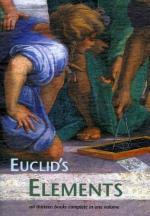|
This section contains 12,354 words (approx. 42 pages at 300 words per page) |

|
SOURCE: "Alkindi's Critique of Euclid's Theory of Vision," in Isis, Vol. 62, No. 214, December, 1971, pp. 469-89.
In the following essay, Lindberg presents an analysis of Euclid's Optica by Alkindi (d. 873), an early Islamic philosopher. Lindberg states that Alkindi "placed himself firmly on the side of Euclid" in many respects, but that the philosopher disagreed with Euclid on the nature of the "visual cone, " one aspect of the mathematician 's theory of vision.
Alkindi, undoubtedly the first great philosopher of the Islamic world, was a leader in the endeavor to communicate Greek philosophy to Islam.1 Not only did he participate in the translating activity of the ninth century, but he also attempted to integrate Greek philosophy with Mu'tazilite theology and thus, in Walzer's phrase, "to naturalise Greek philosophy in the Islamic world."2 Alkindi's deep respect for ancient thought is revealed in the preface to one of his works on metaphysics...
|
This section contains 12,354 words (approx. 42 pages at 300 words per page) |

|


